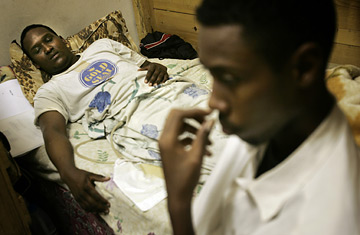
Abdi Maalim Ibrahim, 26, in a wheelchair in Port Elizabeth, South Africa..
In a tiny room at the back of a Somali restaurant near Port Elizabeth's harbor, Abdi Maolin, 26, has spent 11 months lying on a dirty mattress, eating kitchen leftovers and urinating through a tube attached to his bladder. Propping himself up on his elbows, Abdi digs out a police report that describes how on June 6 last year, six men stormed a Somali grocery store where Abdi and his elder brother Mohammed worked. One shot Mohammed in the forehead, killing him. When Abdi ran, another shot him in the spinal chord, paralyzing him from the chest down. Abdi says the killers wanted him to know why. They told him he was stealing South African land, taking South African money. They called him "kuwara" — nigger. "But they were black," says Abdi. "They were African, like me."
As the richest nation in a blighted continent, South Africa is a magnet for immigrants. And, as in Western Europe and the U.S., the more foreigners arrive, the greater the hostility to their presence. South Africans commonly blame Zimbabweans who fled their country's implosion — there are between 1 and 2 million here — for a recent surge in crime. Nigerians escaping violence and corruption are viewed as a nation of drug dealers. They, and Congolese, Angolans, Rwandans and Burundians, have been among the victims of deadly bias attacks in recent years. Black poverty in South Africa may be fueling resentment against immigrants: Unemployment levels run close to 30%, and at more than 50% for people aged 15-24, according to a 2006 survey. With so few jobs to go around, outsiders seeking opportunities find little welcome in disadvantaged communities.
But it is the Somalis — insular, entrepreneurial and, above all, prosperous — who bear the brunt of South Africa's new prejudice. The Southern African Somali Association says more than 400 Somalis were murdered here in the last decade. In three days over Christmas 2004, seven were killed. Last year, 32 were murdered in and around Cape Town alone. Black South Africans have begun purging their neighborhoods. Last August in Cape Town, a crowd of 200 drove Somalis out of the seaside township of Masiphumele. On February 12, after a Somali shopkeeper fired on a robber and killed a passerby in Port Elizabeth, a mob looted and burned 89 Somali stores.
The wounds of that pogrom are still fresh. As Abdi talks, a troop of crippled young Somali men arrive. One has a cast on his left forearm, the bone shattered by a bullet; another is on crutches, his right leg amputated after a knee-capping; a third lost his left eye. Abdi's room feels like a field hospital. But it was to escape such horrors — militiamen had killed their mother and another brother on their farm outside Baidoa — that Abdi and his brother left in 2004. "We chose South Africa for a better life," he says. "We came here for peace. But we got a war worse than Somalia."
African immigrants in South Africa are not unaware of the irony of their treatment in the self-proclaimed "Rainbow Nation," whose constitution declares "that South Africa belongs to all who live in it, united in our diversity." But for Betri Jama, 21, whose shop in Motherwell was razed in February, South Africans are not learning from their own history: "The same people who know oppression, who know dehumanization, they are the people who are oppressing us now," she says.
Kate Lefko-Everett is a Cape Town-based researcher for the South African Migration Project points out another reason that local xenophobia is so galling to other Africans. "During apartheid, there were so many South African leaders who lived in exile, political refugees who were treated as heroes in foreign countries," she explains. "Those countries are asking: 'And now you treat us like this?' "
At Motherwell police station, Capt. Andre Beetge says the protection of Somalis is a priority. But he also reflects what Lefko-Everett says is widespread official ambivalence about refugees. "Immigrants should expect a little difficulty from locals," says Capt. Beetge. "And maybe they should weigh up what they are experiencing in their own country with what they are experiencing here. If it really is that bad here, why don't they go back?"
Thirteen years after the country's first democratic election, the constitution's promise of a nation united in its diversity may remain more an aspiration than a reality. In today's South Africa, whites, coloreds and blacks still segregate themselves into single-race neighborhoods — not by law, but consent and economic circumstance. "It's the continuation of the apartheid mindset," says Lefko-Everett. And apartheid's saddest legacy turns out to be this: it didn't just make racists out of whites.
